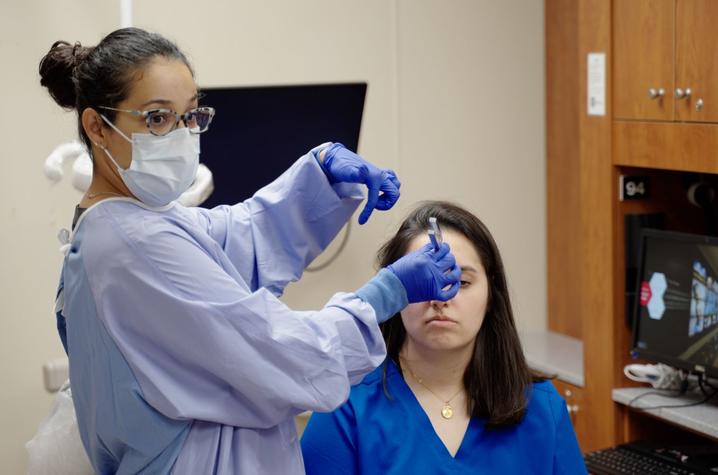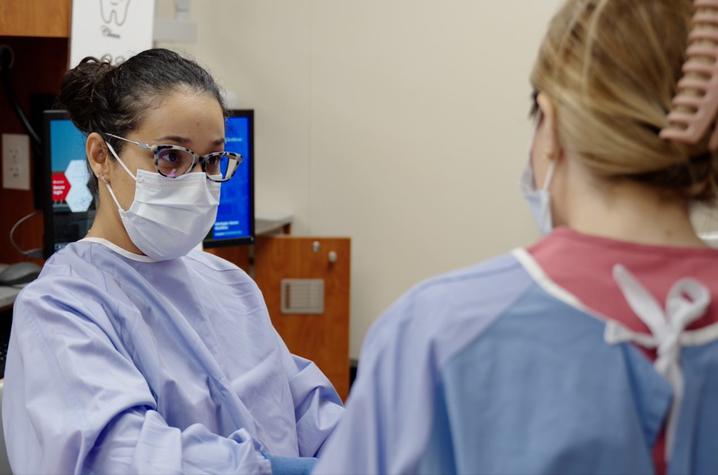UK dentistry, pharmacy researchers partner on opioid alternatives for adolescent pain management
Video produced by UK Research Communications. To view captions for this video, push play and click on the CC icon in the bottom right-hand corner of the screen. If using a mobile device, click on the "thought bubble" in the same area.
LEXINGTON, Ky. (April 17, 2023) — With National Institutes of Health funding, faculty from the University of Kentucky College of Dentistry and College of Pharmacy are examining opioid prescriptions for adolescents and young adults after major dental procedures.
Principal investigators on the award, Marcia Rojas-Ramirez, D.D.S., assistant professor of dentistry, and Doug Oyler, Pharm.D., assistant professor of pharmacy practice and science, teamed up to implement an intervention strategy with dental providers to reduce the amount of opioid prescriptions they write after dental procedures.
“Many of us personally know someone who has been affected by a substance use disorder and have seen how devastating these can be not only to the individual, but also family members and the community,” Rojas-Ramirez said. “So, acknowledging and observing that, knowing the role of dentistry in this opioid epidemic has been a factor leading to the development of this proposal.”
“We are working with many of the largest oral surgery practices in Kentucky to try to implement strategies that can help them revise the way they’re prescribing pain medication,” Oyler said. “So, we are trying to understand how dentists make these decisions and help them realize that medications like Tylenol and ibuprofen seem to work just as well as opioids.”
Research has shown that one of the leading prescribers of opioids to adolescents and young adults are dentists and oral surgeons. This study aims to reduce the exposure of opioids to this population.
“This age range is when people get teeth extracted for braces, or they’re getting third molars removed,” Rojas-Ramirez said. “Things of that sort. So, we see a spike in demand for those procedures within this population, with a spike in opioid prescriptions, and research shows they have a higher risk of misuse of these substances later on, upon this first exposure.”
While this is an issue seen across the country, it especially hits home for those in the Commonwealth.
“Kentucky has been one of the states more affected by the opioid epidemic,” Rojas-Ramirez said. “There are specific counties within Kentucky that have rates of opioid abuse that are much higher than the national average. So, we’re living in a place that has the potential to benefit significantly by the results of this intervention.”
The faculty are currently in the planning phase of this project, funded by a UG3 award from the National Institute for Dental and Craniofacial Research (NIDCR) for $580,000 for one year. The UK team is working in collaboration with NIDCR to recruit dental clinics across the state of Kentucky that will be a part of the clinical trial during Phase 2. Once the team meets project milestones, they will be eligible for a four-year, $5.3 million UH3 award to fund Phase 2.
“During Phase 2, we’ll be doing some education with dentists to teach them about other pain medication,” Oyler said. “But also giving them some patient education that describes pain control and how opioids and non-opioids fit in to pain management. As an alternative to opioids, we’re giving them Tylenol and ibuprofen as blister-packaged medications to give patients right there in the clinic.”
Oyler and Rojas-Ramirez want providers to understand that there is indeed a place for opioid-based pain management. But understanding why and when to use them, could save lives.
“We must understand, with pain management, that when the cons outweigh the pros, we shouldn’t be using things like opioids,” Oyler said. “But of course, when the pros outweigh the cons, then it would make sense. There is a place for medication like this, and they’ve done a lot of good. But this is a balancing act.”
Oyler says the one key to this approach is empowerment.
“The overall approach is trying to empower the providers as well as the patients,” Oyler said. “We want to embrace a more holistic approach to pain management — and there’s a lot of people that this approach could positively impact and increase their quality of life.”
Rojas-Ramirez says this project wouldn’t have been possible without the generous collaboration between the College of Pharmacy and College of Dentistry, generated by the Igniting Research Collaborations. This program fosters new cross-college projects and is sponsored by the UK Office of the Vice President for Research.
“Dr. Oyler and I started collaborating a few years back,” Rojas-Ramirez said. “With his expertise in opioids and my expertise in the dental field, we were very nicely able to intertwine those interests and develop projects which led to this successful proposal. It’s been a great collaboration, and a very fun experience.”
For Rojas-Ramirez and Oyler, the work has just begun.
“It’s been a lot of work to even get to the planning phase of this study and get the grant in the first place,” Oyler said. “To get the opportunity to actually do the work and implement the study has allowed us to celebrate a little bit up-front. But now, we know we must buckle-down and bring it all to fruition.”
Both researchers are looking forward to working together and with students over the next five years.
“It’s been extremely rewarding to work at a large university that has such an impact in the state of Kentucky,” Oyler said. “And, of course, it’s so rewarding to work with these world-class researchers who are so incredibly good at what they do. They are so willing to help other people, even when we’re outside of their expertise. So that’s very rewarding in itself.”
“The staff and our many colleagues involved have supported us so much during this first part of the project,” Rojas-Ramirez said. “They have been key in our success with this particular grant. I’m excited to recruit some students to help us out during Phase 2, so they can get some great experience working on a project of this caliber, and to learn how to work with a team as great as ours.”
Research reported in this publication was supported by the National Institute for Dental and Craniofacial Research of the National Institutes of Health under Award Number UG3DE032621. The content is solely the responsibility of the authors and does not necessarily represent the official views of the National Institutes of Health.



As the state’s flagship, land-grant institution, the University of Kentucky exists to advance the Commonwealth. We do that by preparing the next generation of leaders — placing students at the heart of everything we do — and transforming the lives of Kentuckians through education, research and creative work, service and health care. We pride ourselves on being a catalyst for breakthroughs and a force for healing, a place where ingenuity unfolds. It's all made possible by our people — visionaries, disruptors and pioneers — who make up 200 academic programs, a $476.5 million research and development enterprise and a world-class medical center, all on one campus.




